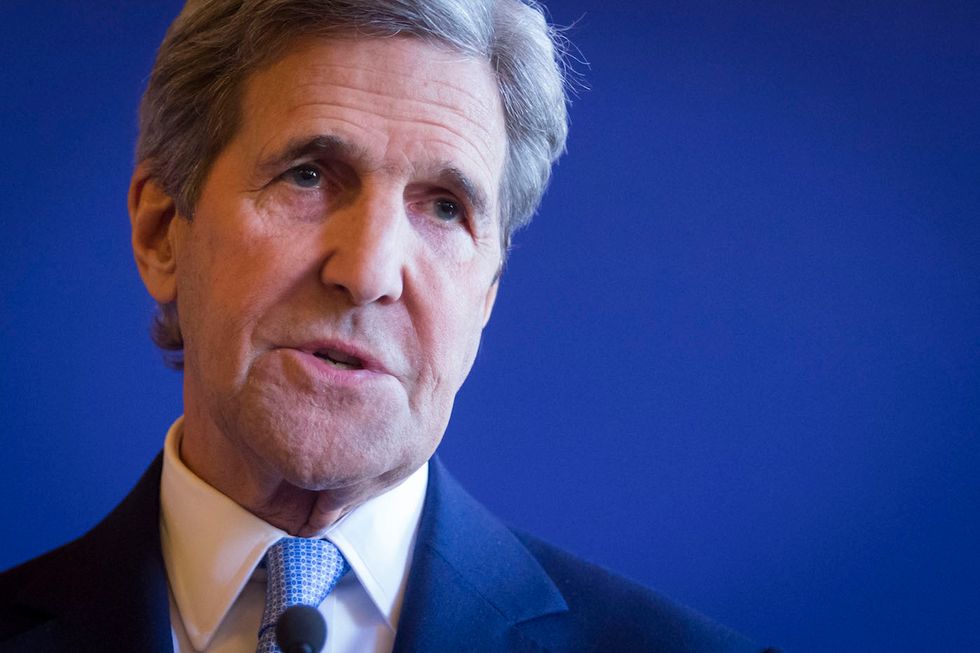
U.S. Secretary of State John Kerry speaks following meeting between the US and its European allies on the situations in Libya, Syria, Ukraine and Yemenon March 13, 2016 in Paris. (Image source: Geoffrey van Van Der Hasselt/AFP/Getty Images)

WASHINGTON (AP) — Secretary of State John Kerry will miss this week's congressional deadline for deciding whether atrocities by the Islamic State against Christians and other minorities in Iraq and Syria should be designated genocide, the State Department said Wednesday.
Department spokesman Mark Toner said Kerry is taking a "measured" approach and while his decision will come "soon" it will not meet Thursday's deadline. Other officials said they expected the determination could be made next week.

"He recognizes the seriousness of the atrocities committed by this terrorist group as well as the importance of this issue to its victims and survivors," Toner told reporters. "Given the scope and the breadth of the analysis he's contemplating, he will not have a final decision completed by the congressionally-mandated deadline tomorrow. However, this issue is clearly of the utmost importance to him as well as Congress, and we expect him to reach a decision very soon."
[sharequote align="center"]"...we expect him to reach a decision very soon."[/sharequote]
Congress had set a March 17 deadline for the determination. Earlier this week, the House passed a non-binding resolution by a vote of 393-0 condemning Islamic State group actions as genocide.
Reaction to the delay from lawmakers was swift.
"This is heartbreaking. There has been ample time for analysis. The evidence of ISIS genocide against Christians, Yezidis, and others is horrifyingly clear," said Rep. Jeff Fortenberry, the Nebraska Republican who authored the bill. "I cannot understand the hesitation by the State Department."
"There's absolutely no reason for further delay," said Rep. Ed Royce, R-Calif., the chairman of the House Foreign Affairs Committee.
An executive branch determination of genocide by the Islamic State would mark only the second time a U.S. administration has reached that conclusion while a conflict is ongoing.
The first was in 2004, when Secretary of State Colin Powell determined that atrocities being committed in Sudan's Darfur region constituted genocide.
Powell reached that determination amid much lobbying from human rights groups but only after State Department lawyers advised him that it would not — contrary to legal advice offered to previous administrations — obligate the United States to take action to stop it.
In that case, the lawyers decided that the 1948 U.N. Convention against genocide did not require states to prevent genocide from taking place outside of their territory. Powell instead called for the U.N. Security Council to appoint a commission to investigate and take appropriate legal action if it agreed with the genocide determination.
Kerry faces similar issues, although Toner suggested Kerry has already received a similar legal opinion.
Toner said a genocide determination in the IS group case "would not necessarily result in any particular legal obligation for the United States."
Although the United States is already involved in military strikes against the Islamic State and has helped prevent some incidents of ethnic cleansing, notably of Yazidis, some argue that a genocide determination would require additional U.S. action. At the least, a determination would probably be accompanied by a referral to the Security Council for possible prosecution by either the International Criminal Court or some other tribunal that might be set up specifically for Syria and Iraq.
Kerry must also weigh whether the Islamic State group's targeting of Christians and other minorities meets the legal definition of "genocide," which is "acts committed with intent to destroy, in whole or in part, a national, ethnic, racial or religious group," according to the U.N. Convention.
In a bid to push the process, several groups released reports last week documenting what they said is clear evidence that the legal standard has been met.
The Knights of Columbus and In Defense of Christians, which had applauded Monday's House resolution, said they hoped the delay would ensure that Kerry makes the determination.
"There is only one legal term for this, and that is genocide," said Knights of Columbus chief Carl Anderson. "We hope that the additional time that the State Department is taking ensures that it will come to the appropriate decision by declaring that genocide is occurring against Christians and other religious minorities in the Middle East."
In Defense of Christians said it was "encouraged to know that the State Department is carefully reviewing the report and all incoming evidence, to ensure as fully an informed decision as possible."
The groups' 280-page report identifies by name more than 1,100 Christians who have been killed by Islamic State militants. It also details numerous instances of people kidnapped, raped, sold into slavery and driven from their homes, along with the destruction of churches.
—